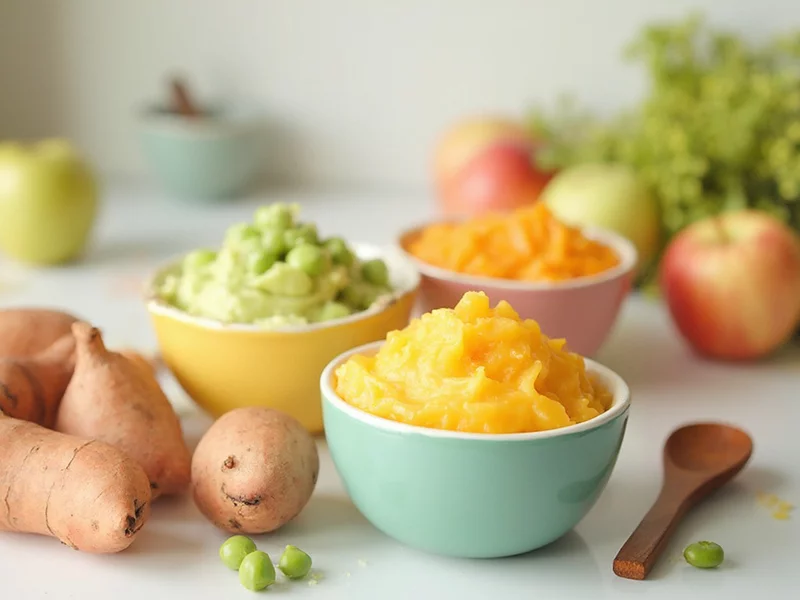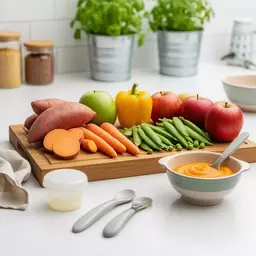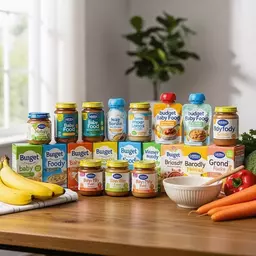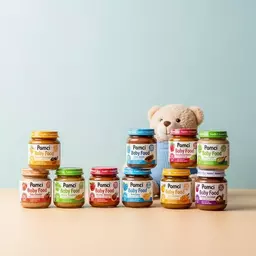✓Control Over Ingredients
Select fresh, organic ingredients tailored to your baby's dietary needs, avoiding unwanted additives.
Have you ever considered how the food you give your baby could shape their future? The journey of introducing solid foods is a critical time that can set the stage for lifelong eating habits. Let’s explore the world of homemade baby food and why it might just be the best choice for your little one!
Making baby food at home offers distinct advantages for your child's nutrition and development. Discover the core benefits below.
Select fresh, organic ingredients tailored to your baby's dietary needs, avoiding unwanted additives.
Homemade options are often significantly cheaper than purchasing commercial baby food products.
Tailor recipes to your baby's preferences, introduce diverse flavors, and ensure a broad spectrum of nutrients.
When it comes to our little ones, every parent wants the best, right? That’s why I started Best Baby Food Australia—to provide parents like you with the information needed to make informed choices about baby food. One of the best decisions you can make is to consider homemade baby food. It’s not just about convenience; it’s about giving your child a strong nutritional foundation right from the start.
Homemade baby food allows you to control the ingredients and ensure your little one is getting safe, healthy, and nutritious meals. Plus, it can be a fun way to introduce your child to new flavors and textures. Learn more about how to make homemade baby food and its benefits from authoritative sources like the Academy of Nutrition and Dietetics, which offers comprehensive guidance on this topic. Let’s dive deeper into why you might want to choose homemade options for your baby!
So, what makes homemade baby food so special? Here are some compelling reasons:
Choosing homemade baby food empowers you as a parent to provide the best for your child. It’s all about fostering healthy eating habits from an early age, which can lead to better food choices down the line.
Did you know that the first few years of a child's life are crucial for their growth and development? Nutrition plays a vital role during this stage. During infancy, babies need a variety of nutrients to support everything from brain development to immune function. That’s why making informed choices about their food is so important!
In fact, studies show that good nutrition during infancy can lead to better health outcomes throughout a person’s life. When you choose homemade baby food, you are not only focusing on immediate health but also setting the stage for a lifetime of wellness.
As you think about your baby’s nutrition, keep these key considerations in mind:
By focusing on these nutritional needs, you're setting your little one up for success in their growth journey. Remember, every bite counts when it comes to nurturing their development!
When preparing homemade baby food, consider incorporating a mix of fruits and vegetables that are in season. This not only enhances the flavor but also ensures you're providing the freshest and most nutritious options for your little one. Seasonal ingredients often have higher nutritional value and taste better, making mealtime even more enjoyable for your baby!
As we wrap up our exploration of homemade baby food, it's clear that tailored nutrition is essential for your baby's growth and development. By preparing meals at home, you have the power to choose fresh, organic ingredients that cater to your little one's specific needs. This not only ensures a healthy start but also fosters positive eating habits that can last a lifetime!
One of the most important insights I've gathered from my journey in child nutrition is the impact of tailored nutrition on our infants. Each baby has unique requirements, so understanding how to meet those needs can set the foundation for their health. Homemade baby food enables you to control what goes into their meals, ensuring they're packed with the necessary nutrients for optimal development.
When it comes to your baby's diet, one-size-fits-all simply doesn't apply! Tailored nutrition means considering your child's preferences, growth milestones, and potential allergies. It lets you focus on delicious, wholesome ingredients that are both enjoyable and nutritious. Here are some key points to keep in mind:
By embracing homemade baby food, you're not just providing a meal; you're creating a nurturing environment that emphasizes the importance of healthy eating habits right from the start. Remember, every bite counts!
In today's fast-paced world, it can be tempting to reach for processed baby food for convenience. However, choosing homemade alternatives can truly make a difference in your child's nutrition. Trust me; I understand the challenges you face! Preparing meals for your little one can feel daunting, but the rewards are worth the effort.
Here are some compelling reasons to opt for homemade baby food over store-bought options:
Choosing homemade baby food is not just about nutrition; it's also about fostering a love for wholesome meals. As I always say, the earlier we start, the better our children's relationship with food will be!
Embarking on the journey of baby nutrition can feel overwhelming, but you don't have to do it alone! Connecting with local resources can provide essential support and community. Here are some ways you can find help:
These connections can help you feel more confident as you navigate this new phase of parenthood! Remember, you're part of a larger community of parents who share similar goals.
To keep your journey exciting, I encourage you to explore more resources and recipes! Here are some great links for further reading:
These resources will keep your ideas fresh as you prepare nutritious meals for your little one!
Don't forget that there are fantastic cookbooks and online communities dedicated to homemade baby food! Here are a few recommendations:
These resources can provide ongoing support and inspiration for creating the best meals for your baby. Remember, you are doing an amazing job in shaping your child's nutrition journey!
Here is a quick recap of the important points discussed in the article:

 What if I told you that making your own baby food could not only save you money but also give you to
What if I told you that making your own baby food could not only save you money but also give you to
 What if the choice of your baby's food could shape their entire approach to nutrition for life? As y
What if the choice of your baby's food could shape their entire approach to nutrition for life? As y
 As you navigate the often overwhelming world of baby food shopping, it's essential to arm yourself w
As you navigate the often overwhelming world of baby food shopping, it's essential to arm yourself w
 As you embark on the journey of selecting the best baby food for your little one, you might wonder h
As you embark on the journey of selecting the best baby food for your little one, you might wonder h